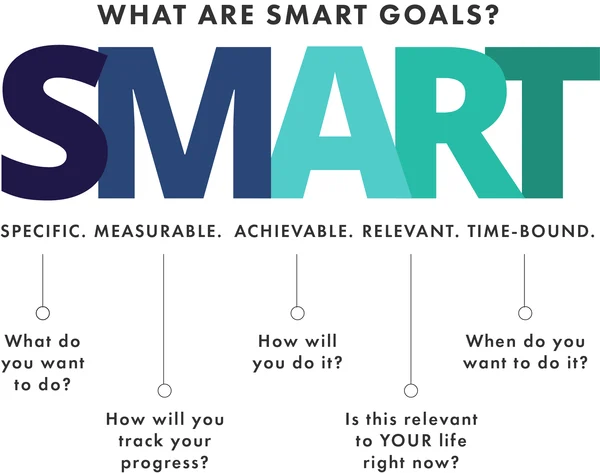Table of contents
What are SMART Goals?
SMART goals are specific targets you want to achieve over a specified period at work. To ensure their success, these goals must be carefully written by both the manager and the direct report. The acronym “SMART” goals describe the most important attributes of each work goal.
The acronym “SMART” stands for “specific”, “measurable”, “attainable”, “relevant”, and “time-bound”. These five characteristics should be present in every goal to ensure that it can be achieved and the employee benefits.
How to Make Your Goals Achievable
Are you ever frustrated by the fact that you are working so hard, but not getting any results? Possibly you don’t see any improvement in your achievements or skills over the past five to ten years. Perhaps you are unable to see the future and your goals for the next few years.
People spend too much time hopping from one job to the next or trying to accomplish more by rushing. You can set SMART goals to clarify your ideas, direct your efforts, maximize your time and use your resources effectively, and increase your chances of achieving your goals.
What Does SMART Mean?
You can use SMART to help you set your goals. Each goal should be clear and achievable in order to ensure clarity
- Specific
- Measurable
- Achievable
- Relevant
- Time-bound
How to Use SMART Goals

1. Specific
It is important to be specific and clear about your goal. Otherwise, you will not be able to concentrate your efforts and feel motivated to reach them. The five “W” questions should be answered when you are drafting your goal.
- What would you like to do?
- Why Is This Goal Important?
- Who Is Involved?
- Where is it located?
- What limits or resources are involved?
For Example, imagine you are a finance executive and want to be the head of finance. One goal might be to “I want the skills and experience to become head of finance in my company, so I can grow my career and lead a team that succeeds.”
2. Measurable
You need to set measurable goals so you can keep track of your progress and remain motivated. You can track your progress and stay focused.
It should address questions like:
- How much?
- How many?
- How do I know when it is done?
For Example, One way to measure your goals of becoming a head of finance is to determine if you have completed all the training courses and gained relevant experience within five years.
3. Achievable
To be successful, your goal must be achievable and realistic. It should be challenging but achievable. You may find previously untapped opportunities and resources that can help you get closer to your goal if you set a realistic goal.
Achievable goals will often answer questions like:
- What can I do to achieve this goal?
- What realistic goals can you achieve if there are other constraints such as financial ones?
For Example, Based on your experience and qualifications, you might have to consider whether the ability to develop the necessary skills to be the head of finance is feasible. Do you have the time and energy to successfully complete the training? Do you have the resources to do it? Are you able to afford it?
Do not set goals that you cannot control. You could say, “Get that promotion!” It depends on who else is applying and the decision of the recruiter. However, “Get the experience that I need for that promotion“ is entirely up to you.
4. Relevant
This is where you make sure your goal matters and aligns with other goals. While we all need help in reaching our goals, it is important that you retain control of them. You are responsible for your own goals, but your plans should drive others forward.
These questions can be answered “yes” by a relevant goal:
- Is this worth it?
- Is it the right time?
- Is this in line with our other efforts/needs/efforts?
- Am I the right person for this goal?
- Does it still apply in today’s socioeconomic environment?
For Example, it is possible to want to be the head of finance in your company, but are you sure it is the right time? Are you confident that you are the right person to be the head of finance? What are your goals for your partner? If you are looking to start a family and want to train in your spare time, is it more difficult to do this?
5. Time-bound
A target date is essential for every goal. This will give you a time frame to set your goals and a direction to follow. This is an important part of the SMART work goal criteria. It helps you to avoid everyday tasks taking precedence over your long-term goals.
These questions will be answered by a time-bound goal.
- When?
- What can I do in six months?
- What can I do in six weeks?
- What can I do right now?
For Example, As we said, additional training and experience may be required to acquire the necessary skills to become a head of finance. What is the time it will take to master these skills? Are you eligible to take certain exams or have other qualifications? You should set realistic goals and a timeframe for achieving your goal.

Pros and Cons
SMART can help you get clear, focused, and motivated to reach your goals. It will help you set goals and a deadline, which can improve your chances of reaching them. SMART goals can be used by anyone, anywhere, without the need to have special tools or training.
SMART can be misunderstood or lose effectiveness depending on how it is interpreted. Some believe that SMART is not flexible enough to meet long-term goals, while others think it may stifle creativity
Conclusion
You can use SMART goals to help you plan and reach your goals at work. There are many interpretations of the acronym’s meaning. The most common is that your goals should be specific, measurable, achievable, relevant, and time-bound. SMART allows you to set clear, attainable, and meaningful goals and provide the support, motivation, and action plan needed to reach them.












